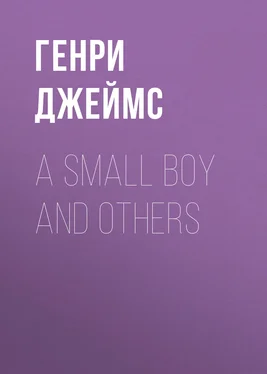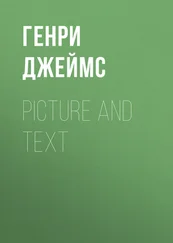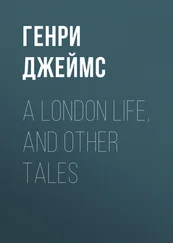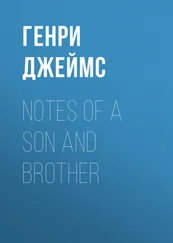Генри Джеймс - A Small Boy and Others
Здесь есть возможность читать онлайн «Генри Джеймс - A Small Boy and Others» — ознакомительный отрывок электронной книги совершенно бесплатно, а после прочтения отрывка купить полную версию. В некоторых случаях можно слушать аудио, скачать через торрент в формате fb2 и присутствует краткое содержание. Жанр: foreign_prose, foreign_antique, на английском языке. Описание произведения, (предисловие) а так же отзывы посетителей доступны на портале библиотеки ЛибКат.
- Название:A Small Boy and Others
- Автор:
- Жанр:
- Год:неизвестен
- ISBN:нет данных
- Рейтинг книги:5 / 5. Голосов: 1
-
Избранное:Добавить в избранное
- Отзывы:
-
Ваша оценка:
- 100
- 1
- 2
- 3
- 4
- 5
A Small Boy and Others: краткое содержание, описание и аннотация
Предлагаем к чтению аннотацию, описание, краткое содержание или предисловие (зависит от того, что написал сам автор книги «A Small Boy and Others»). Если вы не нашли необходимую информацию о книге — напишите в комментариях, мы постараемся отыскать её.
A Small Boy and Others — читать онлайн ознакомительный отрывок
Ниже представлен текст книги, разбитый по страницам. Система сохранения места последней прочитанной страницы, позволяет с удобством читать онлайн бесплатно книгу «A Small Boy and Others», без необходимости каждый раз заново искать на чём Вы остановились. Поставьте закладку, и сможете в любой момент перейти на страницу, на которой закончили чтение.
Интервал:
Закладка:
Those are great words for the daydream of infant ignorance, yet if success in life may perhaps be best defined as the performance in age of some intention arrested in youth I may frankly put in a claim to it. To press my nose against the sources of the English smell, so different for young bibliophiles from any American, was to adopt that sweetness as the sign of my "atmosphere"; roundabout might be the course to take, but one was in motion from the first and one never lost sight of the goal. The very names of places and things in the other world—the marked opposite in most ways of that in which New York and Albany, Fort Hamilton and New Brighton formed so fallacious a maximum—became to me values and secrets and shibboleths; they were probably often on my tongue and employed as ignorance determined, but I quite recall being ashamed to use them as much as I should have liked. It was New Brighton, I reconstruct (and indeed definitely remember) that "finished" us at last—that and our final sordid school, W. J.'s and mine, in New York: the ancient order had somehow to be invoked when such "advantages" as those were the best within our compass and our means. Not further to anticipate, at all events, that climax was for a while but vaguely in sight, and the illusion of felicity continued from season to season to shut us in. It is only of what I took for felicity, however few the years and however scant the scene, that I am pretending now to speak; though I shall have strained the last drop of romance from this vision of our towny summers with the quite sharp reminiscence of my first sitting for my daguerreotype. I repaired with my father on an August day to the great Broadway establishment of Mr. Brady, supreme in that then beautiful art, and it is my impression—the only point vague with me—that though we had come up by the Staten Island boat for the purpose we were to keep the affair secret till the charming consequence should break, at home, upon my mother. Strong is my conviction that our mystery, in the event, yielded almost at once to our elation, for no tradition had a brighter household life with us than that of our father's headlong impatience. He moved in a cloud, if not rather in a high radiance, of precipitation and divulgation, a chartered rebel against cold reserves. The good news in his hand refused under any persuasion to grow stale, the sense of communicable pleasure in his breast was positively explosive; so that we saw those "surprises" in which he had conspired with our mother for our benefit converted by him in every case, under our shamelessly encouraged guesses, into common conspiracies against her—against her knowing, that is, how thoroughly we were all compromised. He had a special and delightful sophistry at the service of his overflow, and never so fine a fancy as in defending it on "human" grounds. He was something very different withal from a parent of weak mercies; weakness was never so positive and plausible, nor could the attitude of sparing you be more handsomely or on occasion even more comically aggressive.
My small point is simply, however, that the secresy of our conjoined portrait was probably very soon, by his act, to begin a public and shining life and to enjoy it till we received the picture; as to which moreover still another remembrance steals on me, a proof of the fact that our adventure was improvised. Sharp again is my sense of not being so adequately dressed as I should have taken thought for had I foreseen my exposure; though the resources of my wardrobe as then constituted could surely have left me but few alternatives. The main resource of a small New York boy in this line at that time was the little sheath-like jacket, tight to the body, closed at the neck and adorned in front with a single row of brass buttons—a garment of scant grace assuredly and compromised to my consciousness, above all, by a strange ironic light from an unforgotten source. It was but a short time before those days that the great Mr. Thackeray had come to America to lecture on The English Humourists, and still present to me is the voice proceeding from my father's library, in which some glimpse of me hovering, at an opening of the door, in passage or on staircase, prompted him to the formidable words: "Come here, little boy, and show me your extraordinary jacket!" My sense of my jacket became from that hour a heavy one—further enriched as my vision is by my shyness of posture before the seated, the celebrated visitor, who struck me, in the sunny light of the animated room, as enormously big and who, though he laid on my shoulder the hand of benevolence, bent on my native costume the spectacles of wonder. I was to know later on why he had been so amused and why, after asking me if this were the common uniform of my age and class, he remarked that in England, were I to go there, I should be addressed as "Buttons." It had been revealed to me thus in a flash that we were somehow queer , and though never exactly crushed by it I became aware that I at least felt so as I stood with my head in Mr. Brady's vise. Beautiful most decidedly the lost art of the daguerreotype; I remember the "exposure" as on this occasion interminably long, yet with the result of a facial anguish far less harshly reproduced than my suffered snapshots of a later age. Too few, I may here interject, were to remain my gathered impressions of the great humourist, but one of them, indeed almost the only other, bears again on the play of his humour over our perversities of dress. It belongs to a later moment, an occasion on which I see him familiarly seated with us, in Paris, during the spring of 1857, at some repast at which the younger of us too, by that time, habitually flocked, in our affluence of five. Our youngest was beside him, a small sister, then not quite in her eighth year, and arrayed apparently after the fashion of the period and place; and the tradition lingered long of his having suddenly laid his hand on her little flounced person and exclaimed with ludicrous horror: "Crinoline?—I was suspecting it! So young and so depraved!"
A fainter image, that of one of the New York moments, just eludes me, pursue it as I will; I recover but the setting and the fact of his brief presence in it, with nothing that was said or done beyond my being left with my father to watch our distinguished friend's secretary, who was also a young artist, establish his easel and proceed to paint. The setting, as I recall it, was an odd, oblong, blank "private parlour" at the Clarendon Hotel, then the latest thing in hotels, but whose ancient corner of Fourth Avenue and—was it Eighteenth Street?—long ago ceased to know it; the gentle, very gentle, portraitist was Mr. Eyre Crowe and the obliging sitter my father, who sat in response to Mr. Thackeray's desire that his protégé should find employment. The protector after a little departed, blessing the business, which took the form of a small full-length of the model seated, his arm extended and the hand on the knob of his cane. The work, it may at this time of day be mentioned, fell below its general possibilities; but I note the scene through which I must duly have gaped and wondered (for I had as yet seen no one, least of all a casual acquaintance in an hotel parlour, "really paint" before,) as a happy example again of my parent's positive cultivation of my society, it would seem, and thought for my social education. And then there are other connections; I recall it as a Sunday morning, I recover the place itself as a featureless void—bleak and bare, with its developments all to come, the hotel parlour of other New York days—but vivid still to me is my conscious assistance for the first time at operations that were to mean much for many of my coming years. Those of quiet Mr. Crowe held me spellbound—I was to circle so wistfully, as from that beginning, round the practice of his art, which in spite of these earnest approaches and intentions never on its own part in the least acknowledged our acquaintance; scarcely much more than it was ever to respond, for that matter, to the overtures of the mild aspirant himself, known to my observation long afterwards, in the London years, as the most touchingly resigned of the children of disappointment. Not only by association was he a Thackerayan figure, but much as if the master's hand had stamped him with the outline and the value, with life and sweetness and patience—shown, as after the long futility, seated in a quiet wait, very long too, for the end. That was sad, one couldn't but feel; yet it was in the oddest way impossible to take him for a failure. He might have been one of fortune's, strictly; but what was that when he was one of Thackeray's own successes?—in the minor line, but with such a grace and such a truth, those of some dim second cousin to Colonel Newcome.
Читать дальшеИнтервал:
Закладка:
Похожие книги на «A Small Boy and Others»
Представляем Вашему вниманию похожие книги на «A Small Boy and Others» списком для выбора. Мы отобрали схожую по названию и смыслу литературу в надежде предоставить читателям больше вариантов отыскать новые, интересные, ещё непрочитанные произведения.
Обсуждение, отзывы о книге «A Small Boy and Others» и просто собственные мнения читателей. Оставьте ваши комментарии, напишите, что Вы думаете о произведении, его смысле или главных героях. Укажите что конкретно понравилось, а что нет, и почему Вы так считаете.











